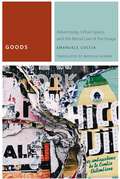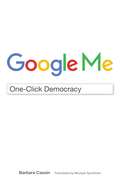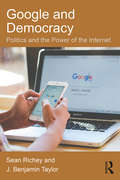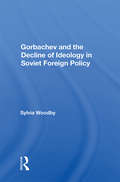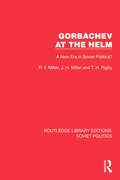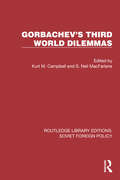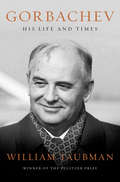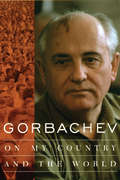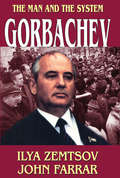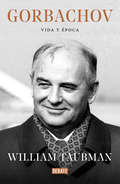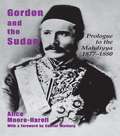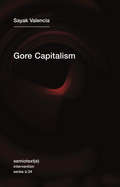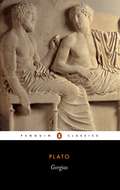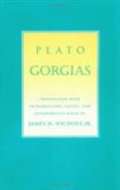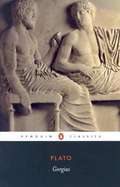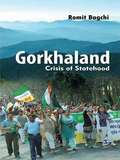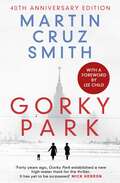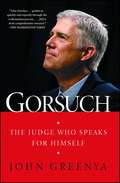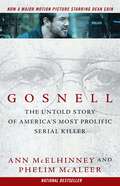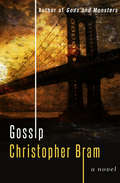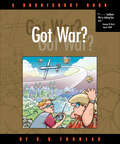- Table View
- List View
Goods: Advertising, Urban Space, and the Moral Law of the Image (Commonalities)
by Emanuele CocciaObjects are all around us – and images of objects, advertisements for objects. Things are no longer merely purely physical or economic entities: within the visual economy of advertising, they are inescapably moral. Any object, regardless of its nature, can for at least a moment aspire to be “good,” can become not just an object of value but a complex of possible happiness, a moral source of perfection for any one of us.Our relation to things, Coccia, argues in this provocative book, is what makes us human, and the object world must be conceived as an ultimate artifact in order for it to be the site of what the philosophical tradition has considered "the good." Thinking a radical political praxis against a facile materialist critique of things, Coccia shows how objects become the medium through which a city enunciates its ethos, making available an ethical life to those who live among them.When we acknowledge that our notion of “the good” resides within a world of things, we must grant that in advertising, humans have revealed themselves as organisms that are ethically inseparable from the very things they produce, exchange, and desire. In the advertising imaginary, to be human is to be a moral cyborgs whose existence attains ethical perfection only via the universe of things. The necessary alienation which commodities cause and express is moral rather than economic or social; we need our own products not just to survive biologically or to improve the physical conditions of our existence, but to live morally. Ultimately, Coccia’s provocative book offers a radically political rethinking of the power of images. The problem of contemporary politics is not the anesthetization of words but the excess power we invest in them. Within images, we already live in another form of political life, which has very little to do with the one invented and formalized by the ancient and modern legal tradition. All we need to do is to recognize it. Advertising and fashion are just the primitive, sometimes grotesque, but ultimately irrepressible prefiguration of the new politics to come.
Google Me: One-Click Democracy (Meaning Systems)
by Barbara Cassin“Google is a champion of cultural democracy, but without culture and without democracy.” In this witty and polemical critique the philosopher Barbara Cassin takes aim at Google and our culture of big data. Enlisting her formidable knowledge of the rhetorical tradition, Cassin demolishes the Google myth of a “good” tech company and its “democracy of clicks,” laying bare the philosophical poverty and political naiveté that underwrites its founding slogans: “Organize the world’s information,” and “Don’t be evil.” For Cassin, this conjunction of globalizing knowledge and moral imperative is frighteningly similar to the way American demagogues justify their own universalizing mission before the world.While sensitive to the possibilities of technology and to Google’s playful appeal, Cassin shows what is lost when a narrow worship of information becomes dogma, such that research comes to mean data mining and other languages become provincial “flavors” folded into an impoverished Globish, or global English.
Google and Democracy: Politics and the Power of the Internet
by J. Benjamin Taylor Sean RicheyFor the first time in human history, access to information on almost any topic is accessible through the Internet. A powerful extraction system is needed to disseminate this knowledge, which for most users is Google. Google Search is an extremely powerful and important component to American political life in the twenty-first century, yet its influence is poorly researched or understood. Sean Richey and J. Benjamin Taylor explore for the first time the influence of Google on American politics, specifically on direct democracy. Using original experiments and nationally representative cross-sectional data, Richey and Taylor show how Google Search returns quality information, that users click on quality information, and gain political knowledge and other contingent benefits. Additionally, they correlate Google usage with real-world voting behavior on direct democracy. Building a theory of Google Search use for ballot measures, Google and Democracy is an original addition to the literature on the direct democracy, Internet politics, and information technology. An indispensable read to all those wishing to gain new insights on how the Internet has the power to be a normatively valuable resource for citizens.
Gorbachev And His Generals: The Reform Of Soviet Military Doctrine
by William C. GreenThis book investigates the debate over Soviet military doctrine and changes in civil-military relations in the Soviet Union since 1985. One of Gorbachev's greatest challenges is to apply "new thinking" to the military sphere. Under this rubric such phrases as "reasonable sufficiency", and "reliable defence" are used by Soviet military leadership to
Gorbachev And The Decline Of Ideology In Soviet Foreign Policy
by Sylvia Babus WoodbyThrough a combination of actions and words, Mikhail Gorbachev has sought to convince the West that the USSR is not dangerous, either militarily or politically. At home, he has sought to convince his countrymen that it is time to abandon the idea that the USSR is at war with the non-socialist world, and that it must keep the West at arms -length. I
Gorbachev and Southeast Asia (Routledge Revivals)
by Leszek BuszynskiFirst published in 1992, this book examines Soviet foreign policy towards Southeast Asia in the context of the transformation of the perestroĭka era in the Soviet Union. The discussion begins in 1985 and ends in 1989 with the Soviet partial withdrawal from Cam Ranh Bay. Buszynski considers Gorbachev’s effort to disengage from the Cambodian problem, the weakening of the Soviet alliance with Vietnam and the real effort to overcome old hostilities with growth areas in ASEAN such as Thailand and Singapore. This is a fascinating and relevant title, of particular value to students with an interest in Russia and the history of international relations in Southeast Asia.
Gorbachev at the Helm: A New Era in Soviet Politics? (Routledge Library Editions: Soviet Politics)
by T. H. Rigby J. H. Miller R. F. MillerGorbachev at the Helm (1987) analyses the policy decisions taken at the 27th Congress of the Communist Party of the Soviet Union in February–March 1986, declared at the time by the Soviet government as a major turning point in Soviet history. It considers the importance of the changes for a number of policy areas, and from a variety of perspectives. The authors examine the degree to which the policy initiatives and associated personnel changes brought about by Gorbachev in certain key areas – domestic politics, general economic policy and administration, agriculture, ideology and foreign policy – constitute substantial innovations.
Gorbachev's Third World Dilemmas (Routledge Library Editions: Soviet Foreign Policy #6)
by Campbell Kurt M.Gorbachev's Third World Dilemmas (1989) examines the strategic, political and ideological criteria which shaped Soviet policies toward the developing world. Organized around particular themes and issues, it pays attention to both theoretical fundamentals in Soviet doctrine and to Soviet actions in specific regions. The topics range widely and include: the Soviet conception of regional security; Soviet arms transfers and military aid to the developing world; the developing world in Soviet military thinking; the USSR and crisis in the Caribbean; Soviet policy towards Southern Africa, notably Angola and Mozambique; and Soviet policy towards Southwest Africa. It looks at the activist foreign policy that Gorbachev inherited, and explores the elements of change and continuity that Gorbachev and the Soviets faced.
Gorbachev: His Life And Times
by William TaubmanThe definitive biography of the transformational world leader by the Pulitzer Prize–winning author of Khrushchev. When Mikhail Gorbachev became the leader of the Soviet Union in 1985, the USSR. was one of the world’s two superpowers. By 1989, his liberal policies of perestroika and glasnost had permanently transformed Soviet Communism, and had made enemies of radicals on the right and left. By 1990 he, more than anyone else, had ended the Cold War, and in 1991, after barely escaping from a coup attempt, he unintentionally presided over the collapse of the Soviet Union he had tried to save. In the first comprehensive biography of the final Soviet leader, William Taubman shows how a peasant boy became the Soviet system’s gravedigger, how he clambered to the top of a system designed to keep people like him down, how he found common ground with America’s arch-conservative president Ronald Reagan, and how he permitted the USSR and its East European empire to break apart without using force to preserve them. Throughout, Taubman portrays the many sides of Gorbachev’s unique character that, by Gorbachev’s own admission, make him “difficult to understand.” Was he in fact a truly great leader, or was he brought low in the end by his own shortcomings, as well as by the unyielding forces he faced? Drawing on interviews with Gorbachev himself, transcripts and documents from the Russian archives, and interviews with Kremlin aides and adversaries, as well as foreign leaders, Taubman’s intensely personal portrait extends to Gorbachev’s remarkable marriage to a woman he deeply loved, and to the family that they raised together. Nuanced and poignant, yet unsparing and honest, this sweeping account has all the amplitude of a great Russian novel.
Gorbachev: On My Country and the World
by Mikhail GorbachevHere is the whole sweep of the Soviet experiment and experience as told by its last steward. Drawing on his own experience, rich archival material, and a keen sense of history and politics, Mikhail Gorbachev speaks his mind on a range of subjects concerning Russia's past, present, and future place in the world. Here is Gorbachev on the October Revolution, Gorbachev on the Cold War, and Gorbachev on key figures such as Lenin, Stalin, and Yeltsin. The book begins with a look back at 1917. While noting that tsarist Russia was not as backward as it is often portrayed, Gorbachev argues that the Bolshevik Revolution was inevitable and that it did much to modernize Russia. He strongly argues that the Soviet Union had a positive influence on social policy in the West, while maintaining that the development of socialism was cut short by Stalinist totalitarianism. In the next section, Gorbachev considers the fall of the USSR. What were the goals of perestroika? How did such a vast superpower disintegrate so quickly? From the awakening of ethnic tensions, to the inability of democrats to unite, to his own attempts to reform but preserve the union, Gorbachev retraces those fateful days and explains the origins of Russia's present crisis. But Gorbachev does not just train his critical eye on the past. He lays out a blueprint for where Russia needs to go in the next century, suggesting ways to strengthen the federation and achieve meaningful economic and political reforms. In the final section of the book, Gorbachev examines the "new thinking" in foreign policy that helped to end the Cold War and shows how such approaches could help resolve a range of current crises, including NATO expansion, the role of the UN, the fate of nuclear weapons, and environmental problems.Gorbachev: On My Country and the World reveals the unique vision of a man who was a powerful actor on the world stage and remains a keen observer of Russia's experience in the twentieth century.
Gorbachev: On My Country and the World
by Mikhail GorbachevThe last president of the Soviet Union discusses Communism, the Cold War, and bringing democracy to Russia in this sweeping political memoir. Drawing on his own experience and rich archival material, Mikhail Gorbachev shares his illuminating perspective on Russia's past, present, and future place in the world. Beginning with the October Revolution of 1917, he notes how much Vladimir Lenin and the Bolshevik Party did to modernize Russia. While he argues that the Soviet Union had a positive influence on social policy in the West, Gorbachev maintains that this positive development was cut short by Stalinist totalitarianism. Discussing the fall of the USSR in depth, Gorbachev examines the goals of perestroika, awakening ethnic tensions, the inability of democrats to unite, and his own attempts to preserve the union through reform. In retracing those fateful days, he explains the origins of Russia's present crisis. He then lays out a blueprint for Russia&’s future, charting a path toward meaningful economic and political reforms. He also presents possible resolutions to a number of international dilemmas, including NATO expansion, the role of the UN, the fate of nuclear weapons, and environmental problems
Gorbachev: The Man and the System
by John FarrarGorbachev: The Man and the System portrays Gorbachev's rise to power and his tenure in office against the background of a period of critical change and development in the Soviet system. The research is primarily based on Soviet materials, supplemented and critically compared with a wide range of Western press and academic studies. Both Zemtsov and Farrar bring to the analysis their own experiences, acquired under different circumstances. Part I focuses on a selected chronology of significant events from Gorbachev's assumption of power in March 1985 to June 1987. The authors examine leadership and personnel changes, the economy, the society, and the arts. Part II takes a look at foreign policies by examining: relations with the United States and the industrialized West; arms control policy; relations with Eastern Europe; relations with the People's Republic of China; and relations with the third world. Part III explores Gorbachev's military policies. Part IV concludes with the authors' assessment of the future. Included in this book are appendices on: changes in the Council of Ministers, Ministers, and Chairmen of State Committees; Politburo and central committee meetings since Gorbachev became General Secretary, through June 1987; and announced changes in the Diplomatic Corps and Foreign Ministry as reported in the Soviet press. The hardcover edition of this book was published in Gorbachev's early years. It thus represents an early assessment, and as such a document of events at the time they occurred. Renewed interest in communism, and in the dissolution of the Soviet Union make this paperback edition timely.
Gorbachov: Vida y época
by William TaubmanLa biografía definitiva del líder que transformó el mundo, narrada por el Premio Pulitzer, William Taubman. Cuando Mijaíl Gorbachov se convirtió en el líder de la Unión Soviética en 1985 la URSS era sin duda una de las dos superpotencias mundiales de aquel entonces. Cuatro años más tarde, la perestroika y la glásnost, máximos exponentes de sus políticas liberales, habían conseguido transformar profundamente el comunismo soviético, lo que le granjeó enemigos de todo el espectro político. Para 1991, gracias a Gorbachov más que a ningún otro dirigente, la Guerra Fría tocaba a su fin y, escapándose por los pelos de un intento de golpe de Estado, el presidente de la URSS asistía al colapso de una Unión Soviética que siempre había intentado salvar. En la primera biografía exhaustiva del último gran líder soviético, William Taubman nos invita a descubrir cómo un joven hijo de campesinos se convertiría enel artífice del desmantelamiento del sistema soviético, cómo ascendería a la cumbre de un régimen diseñado para mantener a la gente como él sometida, cómo encontraría un terreno común con el presidente Ronald Reagan, y cómo permitiría que la URSS y su imperio se desmoronaran. A lo largo de estas páginas, Taubman nos perfila todas las facetas de un personaje único y, en palabras del propio Gorbachov, de «difícil comprensión». ¿Fue en realidad un líder excepcional o solo un personaje que finalmente cayó por sus propias deficiencias, así como por el destino al que se enfrentó? Basándose en entrevistas con Gorbachov, transcripciones y documentos de los archivos rusos, conversaciones tanto con miembros del Kremlin como con sus enemigos más destacados, por no mencionar a los líderes extranjeros, William Taubman nos ofrece en esta monumental biografía un retrato íntimo y honesto, conmovedor y punzante, pero severo, de un personaje cuyavida podría situarse a la altura de una gran novela rusa. Reseñas:«Gorbachov, como su Khrushchev, es un logro extraordinario. [...] Repleto de nueva información y juicios perspicaces; un doble triunfo para el recuento de grandes vidas.»John Lewis Gaddis, ganador del Premio Pulitzer «Magistral. [...] Será por mucho tiempo la biografía definitiva de esta intrigante figura.»The New York Times Book Review «Esta es una lectura esencial para el siglo xxi.»The New York Times «Taubman aplica una lupa tolstoiana a la historia reciente de Rusia y despliega una particular sensibilidad al analizar una vida que demostraría ser más rica que la política.»The Economist «Una penetrante historia y un fascinante estudio psicológico.»Foreign Affairs Magazine «Magnífico e iluminador. [...] Con gran habilidadTaubman deja al descubierto la transformación personal de Gorbachov, fundamental para entender sus últimas decisiones.»The Washington Post «Adictivo. [...] Un maravilloso y conmovedor retrato de uno de los líderes más importantes de Rusia.»Library Journal «Definitiva.»Publishers Weekly «Una investigación fenomenal sobre la vida del hombre que contribuyó más que cualquier otro a cambiar Europa y el mundo a finales del siglo xx.»The Guardian
Gordon and the Sudan: Prologue to the Mahdiyya 1877-1880
by Alice Moore-HarellThis is a study on the period preceding the Mahdist revolution in the Sudan. It analyses the administration and political developments under the governor-generalship of Gordon.
Gore Capitalism (Semiotext(e) / Intervention Series #24)
by Sayak ValenciaAn analysis of contemporary violence as the new commodity of today's hyper-consumerist stage of capitalism.“Death has become the most profitable business in existence.”—from Gore CapitalismWritten by the Tijuana activist intellectual Sayak Valencia, Gore Capitalism is a crucial essay that posits a decolonial, feminist philosophical approach to the outbreak of violence in Mexico and, more broadly, across the global regions of the Third World. Valencia argues that violence itself has become a product within hyper-consumerist neoliberal capitalism, and that tortured and mutilated bodies have become commodities to be traded and utilized for profit in an age of impunity and governmental austerity.In a lucid and transgressive voice, Valencia unravels the workings of the politics of death in the context of contemporary networks of hyper-consumption, the ups and downs of capital markets, drug trafficking, narcopower, and the impunity of the neoliberal state. She looks at the global rise of authoritarian governments, the erosion of civil society, the increasing violence against women, the deterioration of human rights, and the transformation of certain cities and regions into depopulated, ghostly settings for war. She offers a trenchant critique of masculinity and gender constructions in Mexico, linking their misogynist force to the booming trade in violence.This book is essential reading for anyone seeking to analyze the new landscapes of war. It provides novel categories that allow us to deconstruct what is happening, while proposing vital epistemological tools developed in the convulsive Third World border space of Tijuana.
Gorgias
by PlatoTaking the form of a dialogue between Socrates, Gorgias, Polus and Callicles, GORGIAS debates perennial questions about the nature of government and those who aspire to public office. Are high moral standards essential or should we give our preference to the pragmatist who gets things done or negotiates successfully? Should individuals be motivated by a desire for personal power and prestige, or genuine concern for the moral betterment of the citizens? These questions go to the heart of Athenian democratic principles and are more relevant than ever in today's political climate.
Gorgias (Agora Editions Ser.)
by Plato James H. NicholsOne of Plato's most widely read dialogues, Gorgias treats the temptations of worldly success and the rewards of the genuinely moral life. Appealing to philosophers as a classic text of moral philosophy--and to everyone for its vividness, clarity, and occassional bitter humor--this new translation is accompanied by explanatory notes and an illuminating and accessible introduction.
Gorgias (Penguin Classics)
by PlatoTaking the form of a dialogue between Socrates, Gorgias, Polus and Callicles, Gorgias debates perennial questions about the nature of government and those who aspire to public office. Are high moral standards essential or should we give our preference to the pragmatist who gets things done or negotiates successfully? Should individuals be motivated by a desire for personal power and prestige, or genuine concern for the moral betterment of the citizens.
Gorkhaland
by Romit BagchiGorkhaland is an attempt by a journalist to unravel the various layers of the ongoing crisis in the Darjeeling hills, where the Nepali-speaking community is locked in a political struggle with the state of Bengal, of which it is a part. The author endeavours to delve into the deeper recesses of the psyche of the Gorkha community settled in these restive hills and attempts to put the prevailing stereotypes under a subjective scanner. The author approaches the century-old tangle from four perspectives: the history of the region, the problem of assimilation of the various ethnic groups, the course of the movement, from Dambar Singh Gurung to Bimal Gurung, and the hurdles in the way of the fulfillment of the statehood dream. The problem appears insoluble given the odds set against the formation of a separate state, and the people are poignantly aware of the impossibility of realizing this collective reverie. Yet they cannot give in. The writer attempts to give expression to this poignancy at the collective level-the frustration which gets accentuated into a fratricidal mayhem with or without provocations.
Gorky Park (The Arkady Renko Novels #1)
by Martin Cruz SmithTHE NOVEL THAT STARTED IT ALL - ARKADY RENKO NOVEL #1 'One of those writers that anyone who is serious about their craft views with respect bordering on awe' Val McDermid 'Makes tension rise through the page like a shark's fin&’ Independent*** Three bodies found frozen in the snow. And the hunt for the killer begins… It begins with a triple murder in a Moscow amusement center: three corpses found frozen in the snow, faces and fingers missing. Chief homicide investigator Arkady Renko is brilliant, sensitive, honest, and cynical about everything except his profession. To identify the victims and uncover the truth, he must battle the KGB, FBI, and the New York City police as he pursues a rich, ruthless, and well-connected American fur dealer. Meanwhile, Renko is falling in love with a beautiful, headstrong dissident for whom he may risk everything. A wonderfully textured, vivid look behind the Iron Curtain, Gorky Park is a tense, atmospheric, and memorable crime story.Praise for Martin Cruz Smith 'The story drips with atmosphere and authenticity – a literary triumph' David Young, bestselling author of Stasi Child 'One of those writers that anyone who is serious about their craft views with respect bordering on awe' Val McDermid &‘Cleverly and intelligently told, The Girl from Venice is a truly riveting tale of love, mystery and rampant danger. I loved it&’ Kate Furnivall, author of The Liberation &‘Smith not only constructs grittily realistic plots, he also has a gift for characterisation of which most thriller writers can only dream' Mail on Sunday 'Smith was among the first of a new generation of writers who made thrillers literary' Guardian 'Brilliantly worked, marvellously written . . . an imaginative triumph' Sunday Times &‘Martin Cruz Smith&’s Renko novels are superb&’ William Ryan, author of The Constant Soldier
Gorsuch: The Judge Who Speaks for Himself
by John GreenyaLearn all about Neil Gorsuch, the youngest judge to be nominated to the Supreme Court in twenty-five years, with this comprehensive and fascinating biography.When forty-nine-year-old Neil Gorsuch was nominated to the Supreme Court by President Donald Trump, he was told by a senator, “We need to know what’s in your heart.” Now, acclaimed author John Greenya seeks to answer that question with this captivating book. Born in Colorado, Gorsuch remains somewhat of a mystery to Democrats and Republicans alike. Based on intense research and interviews with people who have known Gorsuch in all periods of his life, both his opponents and his friends—from his early work as a lawyer and his year as a Justice Department official, to his ten-and-a-half years on the Federal bench, this is the best way to learn more about the conservative replacement to Justice Antonin Scalia.
Gosnell: The Untold Story of America's Most Prolific Serial Killer
by Ann Mcelhinney Phelim McaleerHe is America’s most prolific serial killer. And yet Kermit Gosnell was no obvious criminal. The abortion doctor was a pillar of his community, an advocate for women’s “reproductive health,” and a respected member of Philadelphia’s professional elite. His Women’s Medical Society Clinic looked like admirable community outreach by a brave doctor committed to upholding women’s rights. Meanwhile, inside the filthy building, Gosnell was casually murdering born-alive infants, butchering women, and making a macabre collection of severed babies’ feet. His accomplices in crime were a staff of dropouts, drug addicts, and unlicensed medical professionals posing as doctors. But even more important to his decades-long crime spree were his enablers in the outside world—from the state bureaucrats who had copious evidence that Gosnell was breaking the law but did nothing to the politicians whose fervent support for abortion rights kept health inspectors away. The “pro-choice” political, bureaucratic, and media establishment smiled on Gosnell—and gave him carte blanche to kill. Even law enforcement seemed to not care. Philadelphia Police Homicide Unit received a complaint about Gosnell years before he was caught, gave it a cursory look, and ignored the evidence. Two women and hundreds of babies died after they closed the case. Luckily, Detective Jim Wood—a narcotics detective—opened a drug case against Gosnell. What he found when he served his warrant left even the most grizzled members of the police force stunned. Now Ann McElhinney and Phelim McAleer, the veteran investigative journalists and filmmakers behind FrackNation, dig into Gosnell’s crimes. A record-breaking crowdfunding campaign financed their Gosnell movie starring young Superman Dean Cain, but in the research for the film, McElhinney and McAleer uncovered fascinating and previously unreported revelations that couldn’t be included in the film. Gosnell: The Untold Story of America’s Most Prolific Serial Killer contains the full results of their investigation.
Gossip: A Novel
by Christopher BramA gripping thriller about contemporary gay politicsRalph Eckhart, an unassuming bookstore manager in the East Village, meets Bill O&’Connor online and they agree to get together during Ralph&’s weekend visit to Washington, DC. The two start a heated, long-distance sexual relationship. But Ralph discovers that Bill is a closeted Republican journalist, whose new book trashes liberal women in Washington—including Ralph&’s speechwriter friend, Nancy—and angrily breaks off the affair. When Bill is found murdered, Ralph becomes the prime suspect. This is a complex psychological and political thriller full of the sexy excitement of &“sleeping with the enemy.&”
Got War?: A Doonesbury Book (Doonesbury #23)
by G. B. Trudeau"Rear Admiral Steve Kunkle, commander of the carrier strike force, grimaced at a Doonesbury comic strip from the Japan Times. It showed a Navy pilot thinking 'Oops!'" As Doonesbury shifts to a wartime footing, the strip's major players find themselves pre-positioned for the coming cakewalk. Weekend warrior B.D. leaves the Fighting Swooshes of Walden in the care of acting Coach Boopstein, returning to the sands of Kuwait as Camp Blowback's Public Affairs Officer. Among his charges: Roland Hedley, veteran of a grueling combat training program designed to keep media folk from getting capped. Offshore, the irrepressible Morale Officer Lieutenant. Tripler goes live ("Good MORNING, regime-changers!") to lift the shipbound spirits of his pre-swarthy charges, while offstage, Viceroy-in-Waiting Duke prepares to answer empire's call. Stateside, Mike takes up a flanking position on the sofa to log some serious CNN time, while the Reverend Sloan girds his loins for peace: "Look for us on TV-we'll be a million strong." Marching to the beat of a different cause, Zonker's old surfing mentor tries to enlist Z in a desperate fight to liberate Left Coastal access. Protests Zonk, "What can I do? I am but one dude!" Meanwhile, Jeff Redfern is but one CIA intern, yet he manages to launch a Predator drone and, using basic Nintendo training, knock out an Al-Q ammo dump. Also taking a hit, Trent Lott, busted for giving props to segregation. "I was trying to say I was down with the hood!" he backpedals, realizing too late that Mr. James Crow has finally left the house.With Alex declaring eco-jihad on SUVs, and Elmont launching a daily assault on coherence as on-line blogger "Jenny McTagart, Girl Pirate," it's hard to see a peaceful world ahead. But Jimmy Thudpucker can. Waging war on the recording industry, he and other filesharers have a vision of ultimate change de regime: "The suits die off, and Pepperland will be free again."
Gough Whitlam: A Moment In History
by Jenny HockingThis moment was not his alone, nor could it ever have come about without him . Gough Whitlam turned to Graham Freudenberg, touched him lightly on the shoulder, saying, 'It's been a long road, Comrade, but we're there', and walked out to meet the spotlight. Acclaimed biographer Jenny Hocking's Gough Whitlam: A Moment in History is the first contemporary and definitive biographical study of the former Labor Prime Minister. From his childhood in the fledging city of Canberra to his first appearance as Prime Minister (playing Neville Chamberlain), to his extensive war service in the Pacific and marriage to Margaret, the champion swimmer and daughter of Justice Wilfred Dovey, the biography draws on previously unseen archival material, extensive interviews with family and colleagues, and exclusive interviews with Gough Whitlam himself. Hocking's narrative skill and scrupulous research reveals an extraordinary and complex man whose life is, in every way, formed by the remarkable events of previous generations of his family, and who would, in turn, change Australian political and cultural developments in the twentieth century.
